Lydia, a worshiper of God
A brief outline of the opening of Europe to the Gospel of Jesus Christ beginning with the baptism of Lydia, a Jewish woman near a city with with few Jews.
I’ll take you back to Philippi, Macedonia (geographically part of Greece) in the 1st c. superpower Empire of Rome and then continue with details of this apostolic account.
Acts of the apostles 16:12
~ A.D. 50 Paulos, Silas & Timotheos
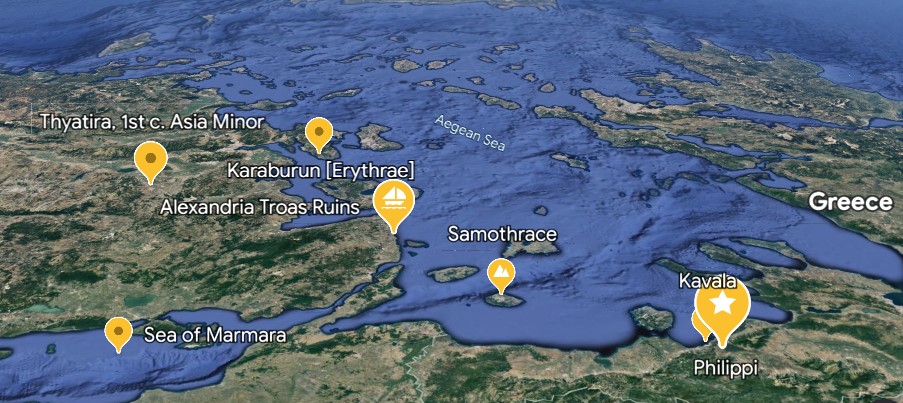
Philippi, which is a leading city of the district of Macedonia and a Roman colony.
We remained in this city some days. – v.12b
Don’t miss it:
These three apostles sent out by the Holy Spirit, worshipers of the risen Lord Jesus Christ whom Paul had encountered in Person, have just sailed across to Philippi after Paul had received a vision of a man of Macedonia asking for HELP.
13 And on the Sabbath day we went outside the gate to the riverside, where we supposed there was a place of prayer, and we sat down and spoke to the women who had come together.

One who heard us was a woman named Lydia.. she was baptized, and her household as well..
Acts of the Apostles 16:14-15 excerpt ESV
Before we introduce you to Lydia, the woman who will become Europe’s first VIP of our second missionary journey — now arrived and residing in Macedonia — let’s glance again at the map and background of this 1st century Roman entry point to Europe across from Asia.
Philippi
Founded in 356 BC by the Macedonian King Philip II, the city developed as a “small Rome” with the establishment of the Roman Empire in the decades following the Battle of Philippi, in 42 BC.
source: unesco
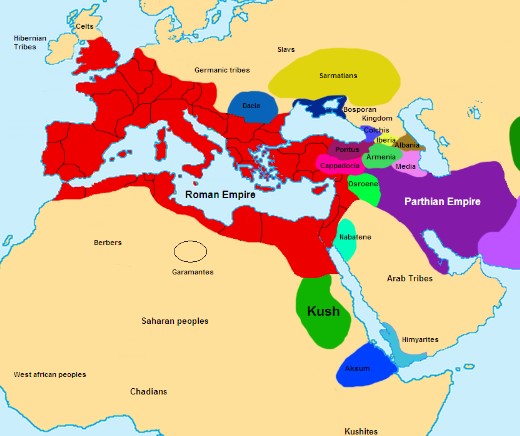
- A.D. 50 – The Roman Empire of Paul’s missionary journeys was vast and dominated the west or European part of Afro-Eurasia connected by the Mediterranean.
- Much of it had once been part of a larger Alexandrian Empire founded by the MACEDONIAN King Philip for which Philippi was named.

- 340 BC – At age 16 he is left in charge of Macedonia during Philip’s attack on Byzantium
- 336 BC – Philip II assassinated; Alexander III becomes King, assassinates rivals, along with the League for Corinth he conquers Greek city-states and amasses an army to invade Persia.
- 334 – 325 BC – Alexander defeats Darius III, king of Persia; Tyre (just S. of 1st Antioch, the church home of Paul’s missions); and Egypt, where he founds the city of Alexandria.
- Alexander now occupied Babylon, city and province.. & invades India, defeating several local rulers.
- source: Britannica.com
Philippi at a cultural crossroads between East and West
Mazaios)[1] (died 328 BC) was an Achaemenid Persian noble and satrap of Cilicia and later satrap of Babylon for the Achaemenid Empire, a satrapy which he retained under Alexander the Great.[2]
As a reward for his recognition of Alexander as the legitimate successor of Darius, Mazaeus was rewarded by being able to retain the satrapy of Babylon, as a Hellenistic satrap.
– source
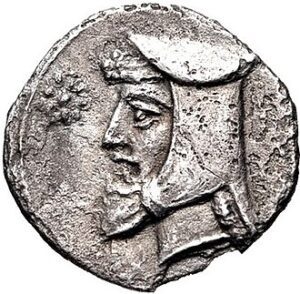
As Mazaeus’s appointment indicated, Alexander’s views on the empire were changing.
He had come to envisage a joint ruling people consisting of Macedonians and Persians, and this served to augment the misunderstanding that now arose between him and his people.
https://www.britannica.com/biography/Alexander-the-Great
This same cultural cohesion of Alexander (from ancient Greek areas and philosophies admired by Rome) is a forerunner of the Pax Romana required of Greek, Roman, Persian, Jewish and all other peoples incorporated in the the Roman Empire.
Continuing in Britannica’s description of Alexander’s final years:
This policy of racial fusion brought increasing friction to Alexander’s relations with his Macedonians, who had no sympathy for his changed concept of the empire.
His determination to incorporate Persians on equal terms in the army and the administration of the provinces was bitterly resented.
https://www.britannica.com/biography/Alexander-the-Great
Philippi – Battleground for the Roman Empire
To what extent Paul and Silas, both Roman citizens, Timothy born of a Jewish mother and Greek father, and Lydia from Thyatira in Asia Minor across the Aegean from Philippi knew this Alexandrian background of their combined cultures we cannot be certain. However we can be confident that all would be familiar with a more recent and decisive incursion here known as the Battle of Philippi.
3 and 23 October 42 B.C.
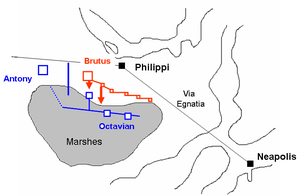
- involving up to 200,000 men in one of the largest of the Roman civil wars
- Brutus pushed back Octavian and entered his legions’ camp.
- to the south, Cassius was defeated by Antony and committed suicide
- the Republican fleet was able to intercept and destroy the triumvirs’ reinforcements of two legions ..The strategic position of Antony and Octavian became perilous
- Octavian’s soldiers were able to capture the gates of Brutus’s camp.. Seeing that surrender and capture were inevitable, Brutus committed suicide
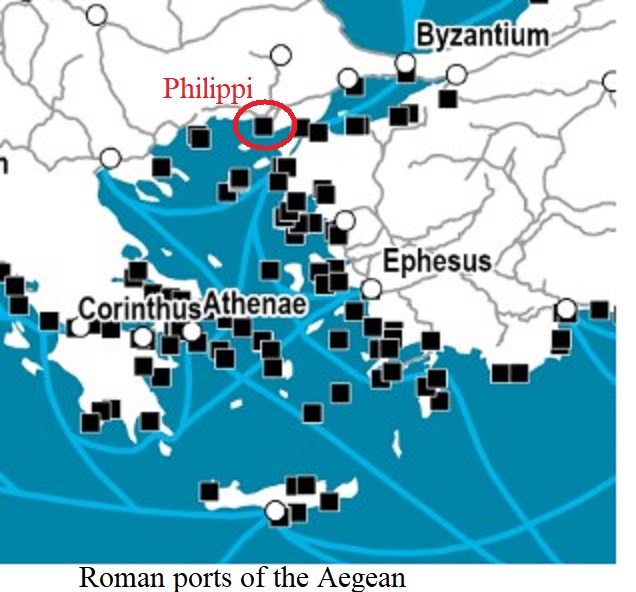
Paul and Silas, Roman citizens, traveled on Roman-approved commercial ships and Roman roads to Roman cities like this leading city of Philippi where they met Lydia.
It is neither Greek in one sense nor as Macedonian as its namesake. And one cultural certainty these travelers encountered after a few days in the city, PHILIPPI is NOT Jewish.
Acts 16:13 – Morning Prayer Outside Philippi
It’s now the Sabbath. Have Paul and Silas found some Jewish men in Roman Philippi?
(IF there are at least 10, then these men would gather in a synagogue in their Macedonian/Roman city.)
16:13 τῇ τε ἡμέρᾳ τῶν σαββάτων ἐξήλθομεν ἔξω τῆς πύλης παρὰ ποταμὸν οὗ ἐνομίζομεν προσευχὴν εἶναι καὶ καθίσαντες ἐλαλοῦμεν ταῖς συνελθούσαις γυναιξίν
Apparently, NO. Not withing the acropolis of these Roman walls. So these faithful Jews seek a place of prayer.
13 And on the Sabbath day we went outside the gate to the riverside, where we supposed there was a place of prayer, and we sat down and spoke to the women who had come together.

Lydia
14 One who heard us was a woman named Lydia, from the city of Thyatira [L on map across the Aegean in Asia Minor], a seller of purple goods, who was a worshiper of God.
The Lord opened her heart to pay attention to what was said by Paul.

And after she was baptized..
and her household as well, she urged us, saying,
“If you have judged me to be faithful to the Lord, come to my house and stay.”
And she prevailed upon us.
ACTS of the apostles + To Be Continued — in Philippi

Leave a Reply